How to Choose the Best High Pressure Washer for Your Cleaning Needs
When it comes to tackling tough cleaning tasks, a high pressure washer can be your best ally. Whether you're looking to rejuvenate your patio, clean your car, or remove stubborn grime from surfaces, choosing the right high pressure washer is crucial for achieving optimal results. With a variety of models and features available on the market, understanding your specific cleaning needs will help you make an informed decision. This guide will walk you through essential considerations, ensuring you select a high pressure washer that fits your individual requirements.
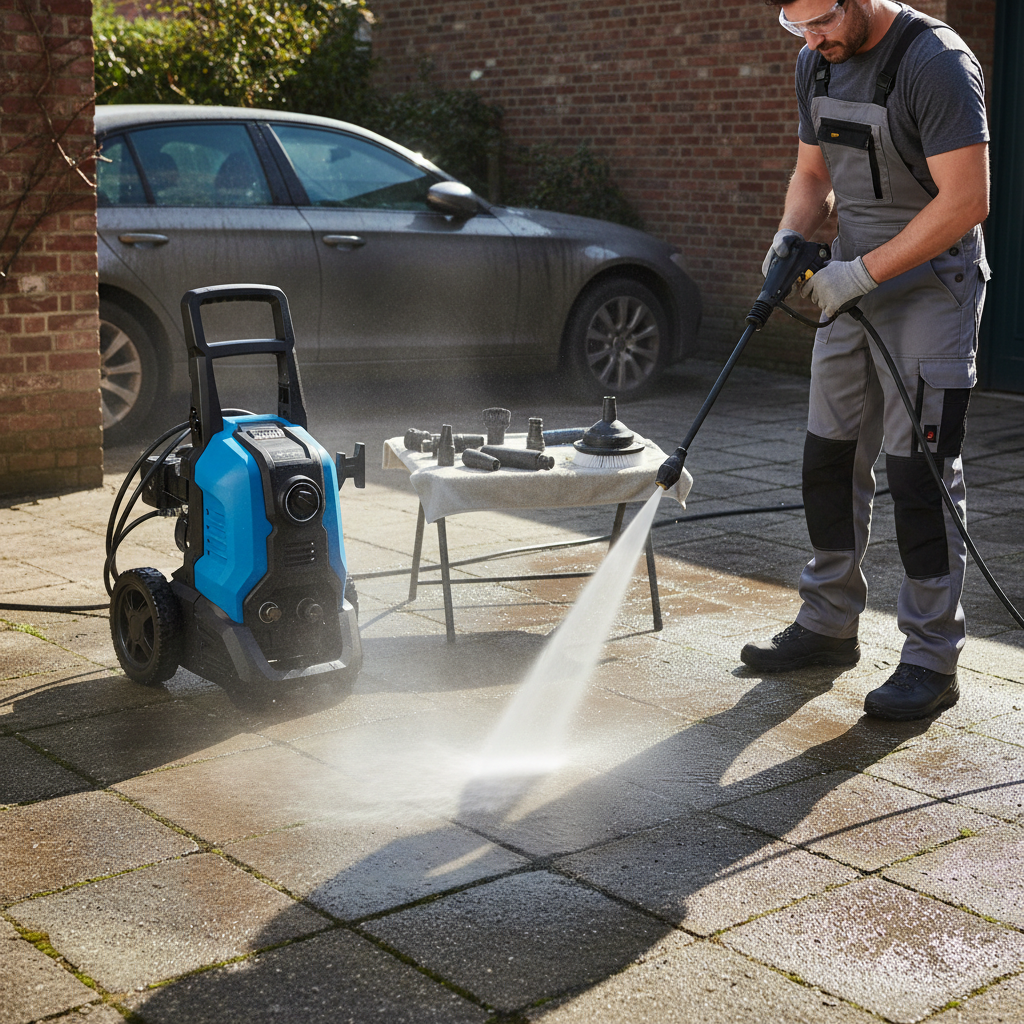
In the pursuit of an effective cleaning solution, one must evaluate factors such as pressure ratings, flow rates, and attachments that can enhance the functionality of your high pressure washer. Different surfaces and cleaning tasks require varying levels of pressure, and selecting a model that provides the right balance of power and versatility is key. By familiarizing yourself with these aspects, you can confidently choose a high pressure washer that not only meets but exceeds your expectations, transforming tedious chores into effortless tasks.
Ultimately, the right high pressure washer will save you time and effort, while yielding impressive results. Whether you're a homeowner seeking to maintain your property or a professional cleaner looking for reliable equipment, understanding how to choose the best high pressure washer tailored to your needs is essential for achieving cleanliness and satisfaction.
Understanding Your Cleaning Requirements
When selecting the best high pressure washer, it's essential to understand your specific cleaning requirements. Different tasks demand varying pressure levels and water flow rates. For instance, the American Cleaning Institute (ACI) reports that for residential cleaning tasks such as patios or driveways, a pressure washer with between 1500-3000 PSI is typically sufficient. Conversely, industrial cleaning might require more powerful units, often exceeding 4000 PSI. Understanding these needs is critical to ensuring you choose a model that can handle the tasks at hand without wasting power or time.
**Tip:** Assess the surface you will be cleaning first—soft surfaces like wooden decks require lower pressure, while concrete and brick can tolerate higher pressures.
Moreover, consider the type of detergent your pressure washer uses. ACI highlights that using the appropriate detergent can enhance cleaning efficiency. Alkaline-based detergents are effective for grease and oil stains, while acidic solutions work best on rust and mineral deposits. Knowing the right detergent for your needs can save both effort and time during the cleaning process.
**Tip:** Always consult the user manual for the recommended detergents to prevent damage to your pressure washer and the surfaces you are cleaning.
How to Choose the Best High Pressure Washer for Your Cleaning Needs
| Cleaning Requirement | Recommended PSI | Recommended GPM | Best for |
|---|---|---|---|
| Light Cleaning (Vehicles, Patio Furniture) | 1300 - 1900 PSI | 1.2 - 1.5 GPM | Residential use |
| Medium Cleaning (Driveways, Sidewalks) | 2000 - 2800 PSI | 1.5 - 2.5 GPM | Residential and light commercial |
| Heavy Cleaning (Graffiti Removal, Decks) | 2900 - 3200 PSI | 2.5 - 3.0 GPM | Commercial use |
| Professional Cleaning (Construction Sites, Heavy Equipment) | 3200+ PSI | 3.0+ GPM | Industrial use |
Key Features to Consider in High Pressure Washers
When selecting a high-pressure washer, it's essential to consider several key features to ensure it meets your specific cleaning needs. First, the pressure rating, typically measured in PSI (pounds per square inch), determines the washer's cleaning strength. For most household tasks, a washer with a PSI of 1300 to 2000 is sufficient, while commercial or more extensive cleaning projects may require a unit with a PSI over 2500.
Another crucial feature is the flow rate, measured in GPM (gallons per minute). A higher GPM means more water is delivered, enhancing cleaning efficiency. Additionally, look for versatility in nozzle options. Many pressure washers come with adjustable nozzles, allowing you to switch between different spray patterns to tackle various surfaces, from delicate items to tough concrete.
**Tips:** Always check the portability of the pressure washer, especially if you plan to use it for outdoor cleaning tasks. Looking for features like detachable wheels and lightweight frame can make transportation easier. Also consider the length of the hose; a longer hose can provide greater reach without the need to move the machine frequently, saving you time and effort during cleaning sessions.
Gas vs. Electric Pressure Washers: Which Is Right for You?
When deciding between gas and electric pressure washers, it's essential to consider the specific cleaning tasks you need to tackle. Gas pressure washers are typically more powerful, making them ideal for tougher jobs like stripping paint or cleaning large driveways. They offer higher PSI (pounds per square inch), which translates to more cleaning power. However, they can be heavier and require more maintenance, including fuel and oil management.
On the other hand, electric pressure washers are usually quieter, easier to maintain, and perfect for lighter tasks like washing cars or patio furniture. They are more convenient for residential use, as they can be easily plugged in without the need for refueling. If you are looking for a more portable and user-friendly option, electric models might be the best choice for you.
**Tips:** Consider the size of your cleaning area and the frequency of use when making your decision. For occasional light usage, an electric washer will suffice, while a gas model is better for extensive, demanding tasks. Additionally, always check the specifications of the pressure washer, as they can vary significantly even within the same category. This can help ensure you select the model that best fits your needs.
Comparison of Gas vs. Electric Pressure Washers
Top Brands and Models for 2025 to Consider
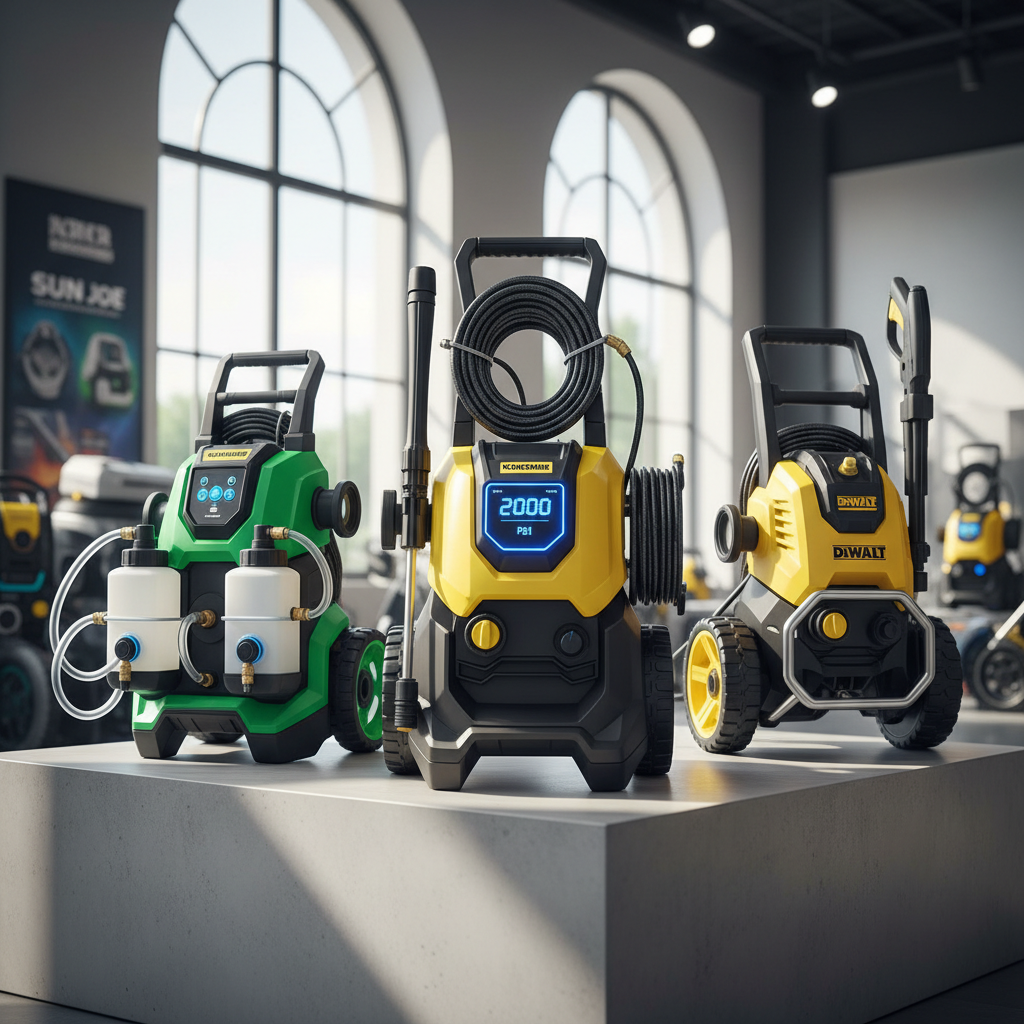
When searching for the best high-pressure washer in 2025, it's essential to consider reputable brands and models that align with your specific cleaning needs. According to the latest industry reports, brands like Kärcher, Sun Joe, and DeWalt are leading the way in performance and reliability, winning over users with their innovative technology and durability. Kärcher's K5 model has been highlighted for its powerful 2000 PSI, making it ideal for tough outdoor cleaning tasks, while the Sun Joe SPX3000 offers a versatile dual detergent system, perfect for those who require multiple cleaning solutions in one machine.
Tips: When selecting a high-pressure washer, think about the type of projects you will tackle. For light cleaning tasks like car washing or patio maintenance, a model offering 1500-2000 PSI should suffice. However, tougher jobs, such as stripping paint or heavy mildew stains, will necessitate a pressure washer with 3000 PSI or more. Don't forget to check for user-friendly features, such as onboard detergent tanks and adjustable nozzles, which can significantly enhance your washing experience.
Additionally, considering environmental efficiency is increasingly important. Energy efficiency ratings and water usage data show that many top brands are now creating eco-friendly models that use up to 80% less water than traditional methods. This not only helps to conserve water but also reduces your overall cleaning costs over time. Always review professional resources and customer feedback, as they provide valuable insights into the effectiveness of each model in real-world situations.
Maintenance Tips for Your High Pressure Washer
Maintaining your high pressure washer is crucial for ensuring its longevity and optimal performance. One of the most important maintenance tasks is to regularly check and clean the filters. Clogged filters can restrict water flow, leading to a decrease in pressure and efficiency. Make it a habit to inspect the filter after each use and clean it according to the manufacturer's instructions. Additionally, regularly checking hoses for cracks or leaks can prevent further damage and costly repairs.
Another vital tip is to properly store your high pressure washer during off-seasons. Ensure that the machine is drained of water to prevent freezing, which could damage the internals. Keeping your washer in a dry environment will help prevent rust and corrosion. Furthermore, it’s beneficial to check oil levels and other fluid levels before operation, as this can significantly affect the performance and lifespan of your unit. By incorporating these maintenance practices, you can keep your high pressure washer operating efficiently for years to come.
Related Posts
-
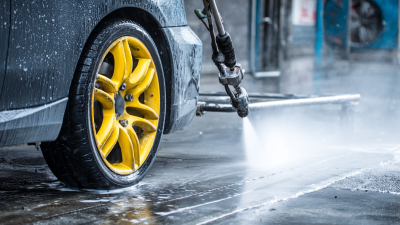
How to Choose the Best High Pressure Washer for Your Cleaning Needs
-
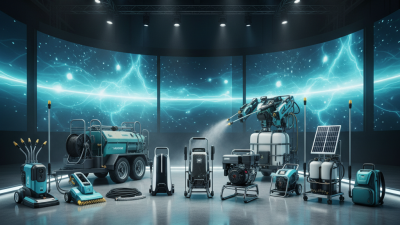
2025 Top 10 Pressure Cleaning Equipment for Ultimate Efficiency and Performance
-

Why Understanding Pressure Washing Techniques Can Transform Your Cleaning Routine
-
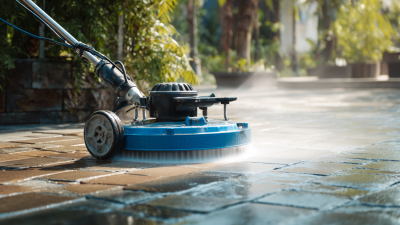
2025 Top 10 Pressure Cleaning Equipment for Ultimate Home and Outdoor Maintenance
-
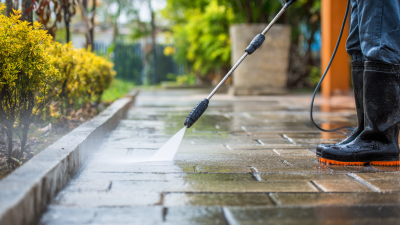
Transform Your Home exterior: The Ultimate Guide to Pressure Washer Cleaning Techniques
-

Discover the Ultimate Guide to Choosing the Best Hot Water Pressure Washer for Your Cleaning Needs